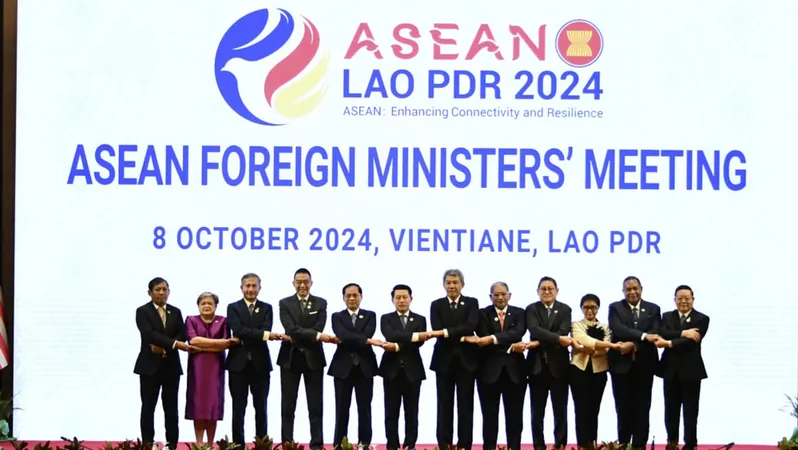
Myanmar Breaks Silence: Sends Representative to ASEAN Summit After Three-Year Hiatus Amid Ongoing Civil War
2024-10-08
Author: Sarah
In a significant diplomatic development, Myanmar will send a representative to the upcoming ASEAN summit in Vientiane, Laos, for the first time in three years, amidst escalating civil conflicts within the nation. This move, reported on October 8th, coincides with heightened efforts by the ruling military junta to regain control over a nation spurred by civil unrest since their coup in February 2021.
The summit, taking place from October 10th, has the ongoing conflict at its core, although previous attempts to find a peaceful resolution have largely failed. Since the coup, ASEAN has barred Myanmar's junta leaders from attending summit meetings, prompting the generals to avoid sending representatives not directly involved in political affairs. However, this week marks a pivotal shift as a senior foreign ministry official, Aung Kyaw Moe, represents Myanmar at the summit, indicating a subtle acknowledgment of ASEAN’s 'five-point consensus' aimed at promoting peace.
This development follows weeks of mounting pressure on the junta, which has faced significant military setbacks against various ethnic armed groups and pro-democracy factions known as the 'People's Defence Forces.' These groups have risen in strong opposition to the military's repressive rule, which has led to significant human suffering—thousands dead and millions displaced.
The junta’s recent invitation to its adversaries for discussions marks an unprecedented step towards potential dialogue and a search for resolution amid the chaos. The dynamics within ASEAN are complex; nations like Indonesia, Malaysia, and the Philippines are increasingly advocating for stronger actions against the junta, while Myanmar's neighbors, like Thailand, approach the crisis with a focus on fostering peace.
As the leaders convene, they will also discuss issues in the South China Sea, an area fraught with maritime disputes involving Beijing and several Southeast Asian nations. China's participation, alongside the United States, Japan, South Korea, Australia, and Canada, underscores the broader international interest in stabilizing Myanmar and regional security.
Thai Prime Minister Paetongtarn Shinawatra emphasized the urgent need for ASEAN to assume a prominent role in restoring peace and has expressed commitment to collaborating closely with Malaysia’s Prime Minister Anwar Ibrahim, who is set to take the ASEAN Chairmanship next year.
In this context, the ASEAN summit represents not just a diplomatic maneuver from Myanmar, but also an essential opportunity for regional leaders to address a crisis that has eroded stability in Southeast Asia for far too long. Will this be the beginning of a new chapter for Myanmar's governance and its relationship with neighboring countries? Only time will tell as leaders prepare for contentious discussions amidst a backdrop of turmoil.




 Brasil (PT)
Brasil (PT)
 Canada (EN)
Canada (EN)
 Chile (ES)
Chile (ES)
 España (ES)
España (ES)
 France (FR)
France (FR)
 Hong Kong (EN)
Hong Kong (EN)
 Italia (IT)
Italia (IT)
 日本 (JA)
日本 (JA)
 Magyarország (HU)
Magyarország (HU)
 Norge (NO)
Norge (NO)
 Polska (PL)
Polska (PL)
 Schweiz (DE)
Schweiz (DE)
 Singapore (EN)
Singapore (EN)
 Sverige (SV)
Sverige (SV)
 Suomi (FI)
Suomi (FI)
 Türkiye (TR)
Türkiye (TR)